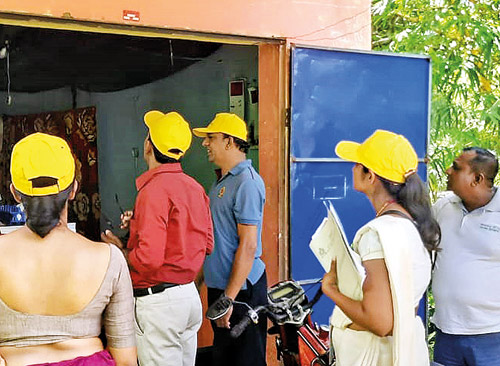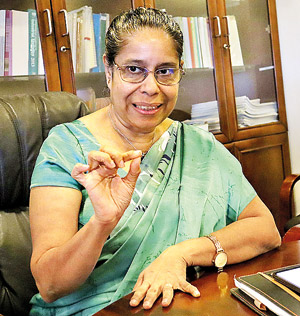News
Census seeks more data on population characteristics

As of today, the department has labelled 8.3 million units: Houses, boarding houses, hotels, community housing units, and non-residential units. Pix by Eshan Fernando
Waste segregation methods, lack of access to water in months of drought, and whether births and deaths have been registered are among some of the new questions that will be posed during the National Census due to take place later this year.
These questions will be asked along with information on the interior structures of houses and even cooking utensils, will be added, said the department’s Director General, Anoja Seneviratne, in an exclusive interview with the Sunday Times.
As of today, the department has labelled 8.3 million units: houses, boarding houses, hotels, community housing units, and non-residential units.
“Around 50,000 officials will be engaged as enumerators in the process; 30,000 of them will be government officials and trained volunteers (who have passed their G.C.E. Advanced level examination),” said Ms. Seneviratne.
The visits to residences are due to take place by September this year.
The long-overdue census is in its last stages. The process had been disrupted for a long period by the Easter Sunday terrorist attacks, the coronavirus pandemic, the economic crisis, and floods.
“Usually, a national census is conducted once every 10 years, with the last digit ending in one (2001, 2011, 2021, etc.),” she said, adding that some developed countries carry out the census once every five years.

Anoja Seneviratne
At present, the department is in its third phase of enumerating, which is likely to end by September. The final phase would be data dissemination and the publication of the preliminary report of the National Census to be presented to the minister-in-charge of the department, President Ranil Wickremesinghe.
“We are currently in the 2020 round, which has a scheduled time period from 2015 to 2024,” she said, highlighting the department’s aim to cover every single individual in the census, including those living on the streets, while avoiding the chance of counting the same individual twice.
Ms. Seneviratne stressed that the Census Ordinance states that withholding accurate information from census officers is a punishable offence, urging the public to cooperate with the officials. As this is the only source of information the government receives to conduct future reports, she requested that people provide accurate information.
“Fill in the yellow card given to you beforehand and submit it to the census officials when they visit your homes,” she advised the people.
The ordinance states that such individuals would be “guilty of an offence and liable on conviction to imprisonment of either description for a term not exceeding one month or to a fine not exceeding one hundred rupees or both.”
“This year’s census is special as we have an advanced digital system for collecting information through tablets,” she said. Census officers and enumerators from five provinces have been trained so far.
Ms. Seneviratne says with pride that despite shortages of tablets, officials were committed to bringing their own devices.
The ‘de jure’ method would monitor individuals for six months, and officials would constantly update the system.
“Individuals residing in a certain area for six months or more would be included in the respective area. If the individual is engaged in a job away from his or her own hometown, we consider the individual a part of the area they reside in a majority of the time,” Ms. Seneviratne said. When including the dispossessed, she said that they would be monitored six hours before the census moment and included in the relevant area.
“Officials of the department alone cannot conduct the census, as it is a comprehensive process, so we have sought the assistance of district administrators,” she said. District secretaries would serve as census commissioners, while divisional secretaries would serve as deputy census commissioners.
The census follows the United Nations (UN) Census Department guidelines adjusted according to the requirements of Sri Lanka. It ensures that sensitive information, such as income, will not be collected and that the information will be secure, as they are not legally obliged to outsource information, according to the provisions of the ordinance.
Explaining the accuracy of the census in an ever-changing society, Ms. Seneviratne said: “The census will be conducted (as in 2012) in a ‘de jure’ method where individuals would not have to remain in their houses, nor will a nationwide holiday be declared as in 2001 as it would be inconvenient to remain in their houses.’’
March 2024 marked the second phase of the census listing approved by President Wickremesinghe, who is Minister of Finance, Economic Stabilisation, and National Policies, through an Extraordinary Gazette dated July 11, 2023.
Ms. Seneviratne explained the complex process: “Before conducting a national census, the minister-in-charge of our department (the Minister of Finance, Economic Stabilisation, and National Policies) should give us an order.”
In 2017, the department began the first phase of census mapping for a GIS (Geographic Information System) database, which continued until 2020. “In this phase, we divide the entire nation into census batches,” she said.
The best way to say that you found the home of your dreams is by finding it on Hitad.lk. We have listings for apartments for sale or rent in Sri Lanka, no matter what locale you're looking for! Whether you live in Colombo, Galle, Kandy, Matara, Jaffna and more - we've got them all!

